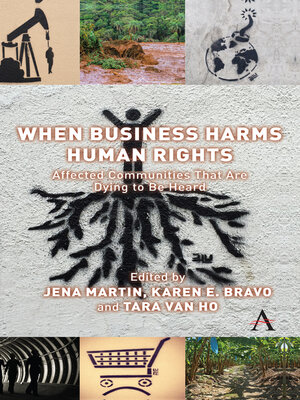When Business Harms Human Rights
ebook ∣ Affected Communities that Are Dying to Be Heard
By Karen Erica Bravo

Sign up to save your library
With an OverDrive account, you can save your favorite libraries for at-a-glance information about availability. Find out more about OverDrive accounts.
Find this title in Libby, the library reading app by OverDrive.



Search for a digital library with this title
Title found at these libraries:
| Library Name | Distance |
|---|---|
| Loading... |
When Business Harms Human Rights uses reported narrations to discuss and analyze the experiences of individuals and communities from around the world, and examines the impact that business activities has had on their lives. The volume is situated within the broader subject area of business and human rights, and uses various methodologies to share the perspectives of affected individuals and communities. The narratives collected here follow rights holders in their attempts to secure remedies, and examine the impact of the emerging legal regime of business and human rights.
|The contemporary business and human rights regime speaks almost exclusively to states and business entities. The absence of victim voices has been a consistent challenge within the field in general as well as within the various literature and policy proposals. This challenge is so widely recognized that, for the first time, the UN made affected communities' access to remedies the central theme at the November 2017 Forum on Business and Human Rights.
"When Business Harms Human Rights" is timely, exploring many of the key themes from the forum and offers an in-depth analysis of business-related human rights impacts and the challenges experienced by rightsholders in accessing remedies. The volume relies on reported narratives of and qualitative data on various incidents where businesses have intersected with affected communities. It allows the voice of the rightsholders to be heard and presents initial ideas regarding best practices that governments and businesses can undertake when engaging with communities. Most importantly, however, this edited volume engages with a larger audience primarily from the perspective of affected rightsholders.
The volume stands as a first-of-its-kind. Indeed, of the scholarly books currently published within the field of business and human rights, none have provided narratives from rightsholders or made their perspectives the center of the narrative.







